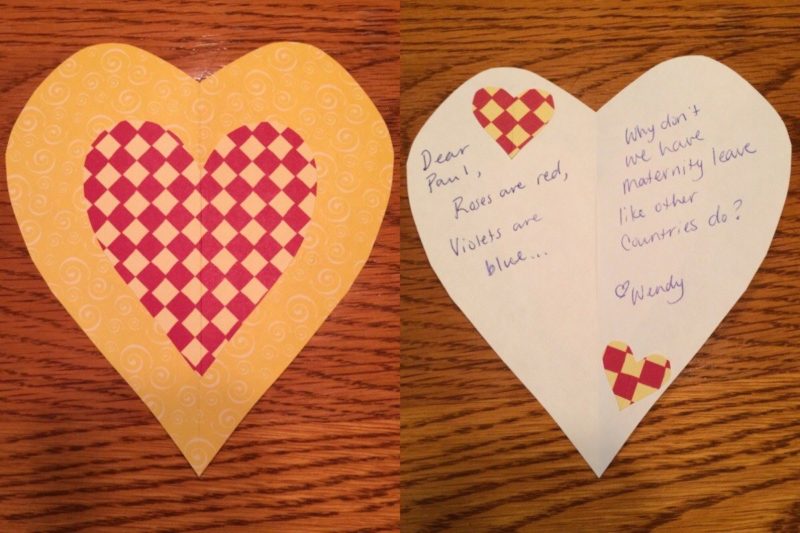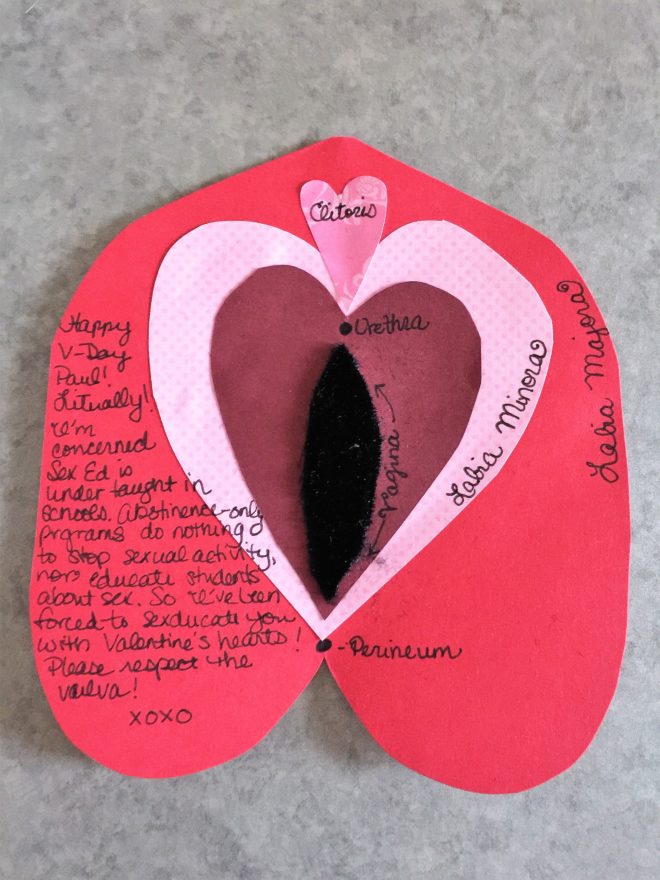Roses Are Red, We All Are Blue: Activists Send ‘Love Letters’ to Speaker Ryan
Co-founded by Katrina Majkut and Wendy Allen, "Love Letters to Paul Ryan" is one of the latest online groups to spring up around social activism.

With Valentine’s Day upon us, a new campaign is showing some “love” to GOP Speaker of the House Paul Ryan.
Co-founded by Katrina Majkut and Wendy Allen, “Love Letters to Paul Ryan” is one of the latest online groups to spring up around social activism. It builds on previous movements and campaigns seeking to turn the love letter into a political gesture.
“We wanted to keep the momentum of the Women’s March going,” said Majkut. “There were a lot of questions surrounding the message or point of the march and we wanted to help answer them.”
Key issues at the march included gender equality, economic equality, immigration, LBGTQ rights, disability rights, and reproductive rights. “Since the issues are intersectional,” Majkut continued, “a Valentine’s Day card seemed like a great platform for individual expression and an intimate and undeniable way to reveal personal concerns.”
In recent weeks, several other letter-writing campaigns have come about to raise awareness of justice issues. The Ms. Foundation for Women invited people to “create a Valentine’s Day card to let [Trump] know that you believe in love, equality, and justice for all people.” Another campaign involved sending #PostcardsToBannon, in hopes of trolling one of the chief architects of the Trump administration while also antagonizing an apparently narcissistic president.
It is Majkut and Allen’s use of Valentine’s Day cards addressed to Paul Ryan that sets their project apart. Rep. Paul Ryan, a ninth-term congressman from Wisconsin, is a “very important person to engage right now,” Allen said. Among other things, the speaker’s stance on a variety of social justice issues, including reproductive rights, is concerning. While peddling false information, Ryan has shown support for cutting Planned Parenthood and other critical reproductive health-care providers from government programs, which will leave many low-income people without access to needed services.
As Allen acknowledges, Ryan isn’t alone in his attempts to infringe on our human rights. “While ‘Love Letters to Paul Ryan’ is a catchy title, we want to encourage participants to write to their own local, state, and federal legislators as well as Mr. Ryan,” Allen said. “It’s so important to make your voice heard, and, well, Valentines are more memorable than a letter on boring, white office paper, don’t you think?”
By making Valentine’s Day cards with a political bent, both Allen and Majkut are hoping to raise greater awareness around several topics in a “funny and cathartic way.” One card designed by an individual within the group is a construction-paper vulva. Another features a poem about maternity leave.

The group also wants to give each card-giver their own sense of individuality as well. Majkut’s noted “we are leaving it to [them] to share their personal message or political statement. It’s open-ended. As feminists, we are not interested in excluding anyone or singularly focusing on one issue.”
Historically, letter-writing campaigns have been used by organizations such as Amnesty International and Human Rights Watch as a powerful political tool. Because this latest campaign is on Facebook, it allows people to come together though an online platform to bring about change.
Both Allen and Majkut are no strangers to activism, though they came to it in different ways. Majkut, an artist and founder of the website TheFeministBride.com, described her work this way: “More or less, my activism always explores how social traditions affect people’s equality and rights. I suppose using traditional Valentine’s Day cards is very much in keeping with the typical work I do. I also interned with the art activist group the Guerrilla Girls Broadband, who similarly work with art and comedy; so they are a big influence on me.”
Allen, a writer, pointed out that different styles of activism are vital. “I’m in the camp of not being very comfortable out marching in big crowds or being forced into an aggressive verbal debate—even though I know what I stand for, these things are stressful for me,” she explained. “But when I’m able to carefully consider my words in writing and use real science to back up what I’m saying, that’s how I am most effective as an activist.”
“There’s room for all styles,” she added. “You just have to find your method.”
